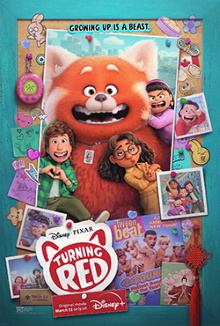The story behind this project is almost as incredible as the film itself with director Domee Shi being asked to pitch ideas after the success of her short film Bao. The result is a resounding success of a debut feature that boldly grapples with the anxieties of a teenage girl growing up better than almost anything else I can think of. Some critics have noted how this is targeted at such a specific audience that it lacks universal appeal. As always, for me it is because of its specificity in being set in a particular place, cultural milieu, and even era with the characteristic Tamagotchi-like toy that it feels so authentic as it recognizably draws on the director’s own life experiences.
13-year-old Mei is a typical Asian overachiever who obeys her parents in all things, especially her mother Ming Lee. In addition to excelling at her school work, she helps to take care of the Chinese temple devoted to her family’s ancestors and is a tourist attraction. However together with her groups of three best friends, she is a also devotee of the boy-band 4*Town, a fact which she keeps from her mother knowing that she wouldn’t approve. One day after her friends ogle at a cute boy who works at a local convenience store, she idly doodles some fantasies of herself being with the boy. Ming finds the notebook and angrily confronts the boy in public, accusing him of taking advantage of her. Mei is mortified and that night suffers from terrible dreams. The next morning she wakes in the form of a giant red panda. At first she tries to hide the transformation from her parents and Ming thinks she is undergoing her first period. But when she finds out the truth, she explains that this is a family blessing, or curse depending on how you see it, inherited from an ancient ancestor.
This film received some pushback from critics who had some difficulty identifying with a Chinese girl living in Toronto struggling with the onset puberty and the approval of parents. But I’m always especially fond of films that are narrowly specific instead of those trying to achieve universal appeal by being set in some generic space and time. So many of the little details in this film rings true, the silly merman doodles in Mei’s notebook, the over-the-top sparkle of 4*Town’s performances, the dynamics of Mei’s friendship. The original music that they create for the group, sickly sweet ballads sung in exaggerated falsettos, show just how hard the filmmakers strove to recreate the phenomenon of boy-bands. The nature of Mei and her friend’s worship of the group also captures an essential characteristic of this type of fandom. The boys who make up the group don’t matter at all and are not real characters. The point is that the friends bond with each other through this shared devotion. It’s a fun group activity that is part of the girls’ growing up and is part escapism, part teenage rebellion. You know just from watching this film and everything in it comes from Shi’s own life.
By now we’ve seen a fair few films about Asian tiger moms so that’s not new, but as my wife notes it’s notable how modest Mei’s secret wish is, a tiny indulgence to reward herself for being a good daughter and ace student at school. All she wants to do is to attend a concert and part of the fun of this film is that this little disagreement between daughter and mother blows up into a kaiju-scale confrontation. I also think that the scene of Ming exposing Mei’s silly crush might be the single greatest example of a child being embarrassed by a parent to the point of wanting to die ever put on film. In addition to the big scenes, Shi juggles all of the small details just right as well in my estimation. For example, she doesn’t forget about trying to make up for the damage caused by the red pandas. I’m always annoyed when superhero movies forget about collateral damage. I also love how she doesn’t turn the inevitable meeting between Mei and her ancient ancestor into an example of the wise elder dispenses indecipherable advice trope. Instead the ancestor Sun Yee is entirely silent and non-judgmental, exactly as it should be in order not to take away the focus from the mother-daughter dynamic.
Since this film was mostly released on streaming services, it’s a little difficult to judge how well received it has been by audiences but Disney claims it’s their top streaming movie. It has certainly been a big hit with the critics and Shi has been promoted to vice-president of creative at Pixar after its release. To me this is among the best of the Pixar films and is a great example of the effectiveness of drawing from minority cultures to tell individualized, personal stories.

2 thoughts on “Turning Red (2022)”